|
FINDING MEANING IN MYSTERIES, by Roberta
Isleib
On the days I work up the nerve to look at the newspaper, the headlines remind me that much of the world is in unfathomable turmoil. And I worry about writing mysteries. Are they not just frivolous entertainment, piling violence onto an already grim universe and satisfying the gruesome leanings of sick fans? I hope not. Abigail Padgett, author of nine novels, describes the lure of the mystery this way: “Mystery readers enjoy being entertained by a good story in which evil is never triumphant.” With that in mind, I asked other authors whose work I admire if they would write a few paragraphs about the meaning they find in their mysteries. 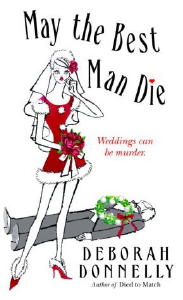 Deborah Donnelly, author of the wedding planner mysteries including May the Best Man Die, has been a university librarian, a corporate speechwriter, a nanny, and a science fiction writer. Says Deborah: “I write murder mysteries, but I certainly don’t believe in murder – or in violence of any kind. In fact I’d be just as happy writing “robbery mysteries,” but that isn’t an accepted form in popular fiction. There’s a reason why murder mysteries are appealing, though; they tell a highly moral story, in which good and evil stand in clear contrast, and good (almost) always wins. “The Wedding Planner Mysteries are my chance to write about a resourceful, good-hearted young woman grappling with making a living, finding romance, and, along the way, solving murders. It’s important to me that Carnegie is honest, loyal to her friends, and quick to defend those who can’t defend themselves. Her ethics are the same as mine, but she gets to have adventures that would be too scary for me! “I also find meaning in my writing because of my readers. As a reader myself, I’ve had many a day brightened, or a difficult night made bearable, because I had a good book to read. I write light fiction, but intelligent light fiction, and when I hear from a friend or even a stranger that they enjoy my characters, or that reading one of my books helped them get through a tough time, I feel that I’m contributing to their lives by using my own peculiar talents as best I can.” Before turning to her mystery series, Jessica Speart was an investigative journalist whose focus was on wildlife law enforcement, endangered species issues, and the environment. Speart created her sleuth, U.S. Fish and Wildlife Agent Rachel Porter, after years of investigating wildlife and drug trafficking crimes for publications such as the New York Sunday Times Magazine, Omni, Travel & Leisure, Audubon, National Wildlife, among others. When she began to find the characters she covered stranger than fiction, she decided to turn her pen toward mysteries. 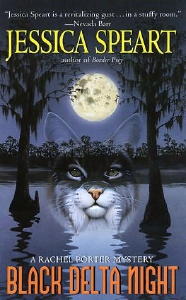 Speart says: “My primary motivation for writing is to convey my passion for wildlife and the environment. I write about endangered species in order to give a voice to creatures that otherwise don't have one. “It's been said that we're on the brink of a new Dark Ages, one in which species and plants are disappearing at an increasingly alarming rate. The illegal trade in wildlife is estimated at $15 billion a year, placing it right behind drug smuggling and ahead of gun running. In fact, it often involves many of the same people. “I spent a number of years as an investigative journalist writing on this topic. Naturally, I covered many cases involving special agents with the US Fish and Wildlife Service. What compelled me to start writing mysteries was seeing the odds that these agents are constantly up against. It came to a head after I spent two weeks slogging through the bayous of Louisiana. There I met poachers who had made big bucks off the illegal wildlife trade and never received more than a slap on the wrist from our legal system. My first book, Gator Aide, was my own form of catharsis in the face of so much injustice.” Speart’s eighth Rachel Porter mystery, Blue Twilight, debuts in September 2004. S. W. Hubbard, an avid hiker and canoeist, has spent many happy hours exploring the High Peaks area of the Adirondacks, where her family built a vacation home on the banks of the East Branch of the AuSable River. She has worked for over 20 years as a marketing promotions writer. 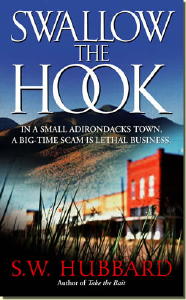 Says Susan (S. W.): Says Susan (S. W.): “Mysteries appeal to so many people because they portray a world where evil is vanquished and justice ultimately prevails. Everything works out and all loose ends are tied up. Obviously, real life rarely works this way. Many people look at religion as a way to explain the unexplainable and make everything work out (in heaven, if not on earth.) In Take the Bait, my teenage character Janelle is frightened and confused by the problems confronting her and her family. She seeks theological advice from her Presbyterian pastor, but he brushes her off, for reasons of his own. Ultimately, she becomes caught up in her research on Utopian religious communities, looking for a belief system that will explain the cruelty and immorality that confronts her. Of course, in the end she has to face the fact that there isn’t one system that will solve all her problems. “When you first begin fiction writing, you simply take an idea and run with it. It’s not until you’ve been writing for a while that you can begin to see themes emerging in your own work. One theme that I explored in Take the Bait – a parent’s essential inability to truly know his child—pops up again in my second book, Swallow the Hook. In this book, my detective, police chief Frank Bennett, investigates an illegal adoption scam, and discovers that decent people can be driven to evil actions out of desperation to protect those they love. “Crazed serial killers hold absolutely no interest for me. I’m fascinated, instead, by evil rearing its head in everyday life. My books take place in a rural area – the Adirondack Mountains of upstate New York. My villains are all people that you would sit down next to on the bus without a qualm. Consequently, my hero is also an Everyman, not a superhero able to single-handedly fight off ten armed men. He worries about his daughter, muddles through his love life and feels queasy at crime scenes. At times he’s overwhelmed by worry and regret, but at heart he’s an optimist who believes that good triumphs over evil.” 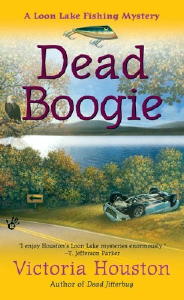 In her teens and 20s, mystery author Victoria Houston was the classic hometown girl who couldn't wait to leave her small Wisconsin town. Now, more than 30 years later, she has not only returned to her hometown, Rhinelander, but she has based her popular mystery series, including the most recent Dead Hot Mama, in the region's fishing culture. Her Loon Lake fishing mystery series features a retired dentist and avid fisherman, Doctor Osbourne, as its protagonist. The doctor – who lives in a small mythical town in the northern woods – often helps his friend and love interest Lew Ferris, the local female chief of police, solve mysteries that revolve around fly and bait fishing and the deep waters of the North Woods. Here’s what Victoria has to say: “Writing a mystery is writing a puzzle. Since life is a puzzle, this ought to come naturally. Some days it does, some it doesn't. “After struggling for twenty years to find the voice and the landscape that would allow me to deal with murder and mayhem in a way that I would find authentic – I was stunned to land right back in the culture and the town where I grew up, the very place and people I couldn't wait to escape forty years ago. “And so it is that the North Woods of Wisconsin are as much a character in my work as the people are. I love this landscape, I can write it from the inside out. I know from experience how treacherous it is, how seductive and how exquisite. I find that the water, the woods, the harsh winters and lovely summers give me ways to put fear, love, courage and uncertainty in my books. “The people in my books are folks I know well – both the good and the bad. I grew up with them, they are real in the sense they are distilled from my memories. (Although, I do cheat on one issue – most of the murderers in my books are based on former bosses.) Willa Cather once said that a writer writes from experiences and memories that occurred before the writer turned thirteen. This is very true for me. “My main character, the man from whose point of view I write, is distilled from the men closest to me as a young girl. I hear their voices so clearly; I witnessed their terrible mistakes, their disappointments and failures, and their small triumphs. My writing their story (they are combined into one character) helps me figure out why they did what they did – and what life meant to them. They fish because that's what people do up here – we do it to escape, to have fun, to forget. Fishing is a pastime where people who might never meet in daily life may share time, space and stories in a boat or while wading a trout stream. Fishing leaves you vulnerable – to weather, to dangerous water, to evil. Too often when you fish – you are alone.... “The only difference between a mystery and life – is that life never gives you the answers. But a mystery must. Those final pages must always bring resolution and, one hopes, good news.” PostScript: Roberta Isleib’s mystery series features LPGA golfer Cassie Burdette, as she puzzles through the mysteries of competition, murder, and her own love life. A second installment of “Meaning in Mysteries” can be found here. This
column first appeared in Mystery*File
44, June 2004.
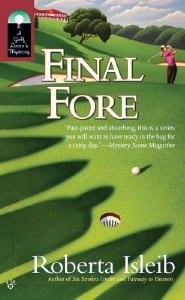 Updates: The sixth Cassie Burdette mystery, Final Fore, by Roberta Isleib, will be published by Berkley, March 2006. Deborah Donnelly’s next adventure of wedding planner Carnegie Kincaid, will be You May Now Kill the Bride, coming from Dell in January 2006. Jessica Speart’s most recent case for wildlife agent Rachel Porter is Restless Waters (Avon, November 2005). S. W. Hubbard’s police chief Frank Bennett has last been seen in Blood Knot (Pocket, July 2005). The next Loon Lake mystery from Victoria Houston will be Dead Boogie, from Berkley in March 2006. _____________________________________ YOUR COMMENTS ARE WELCOME. stevelewis62 (at) cox.net
Copyright © 2004 by Steve
Lewis. All rights reserved to contributors.
Return to
the Main Page.
|